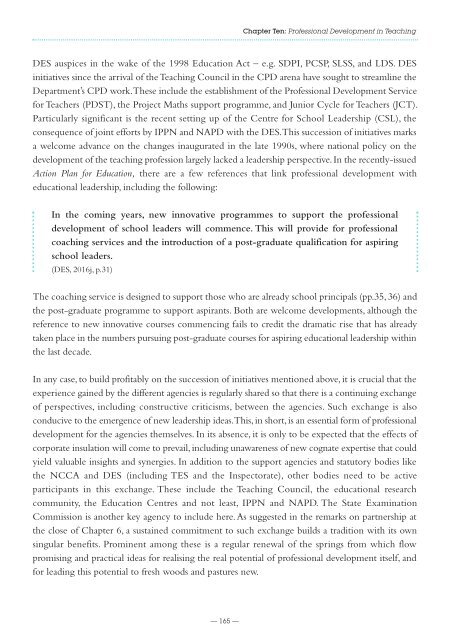Towards a Better Future
A Review of the Irish School System John Coolahan | Sheelagh Drudy Pádraig Hogan | Áine Hyland | Séamus McGuinness
A Review of the Irish School System
John Coolahan | Sheelagh Drudy Pádraig Hogan | Áine Hyland | Séamus McGuinness
You also want an ePaper? Increase the reach of your titles
YUMPU automatically turns print PDFs into web optimized ePapers that Google loves.
Chapter Ten: Professional Development in Teaching<br />
DES auspices in the wake of the 1998 Education Act – e.g. SDPI, PCSP, SLSS, and LDS. DES<br />
initiatives since the arrival of the Teaching Council in the CPD arena have sought to streamline the<br />
Department’s CPD work. These include the establishment of the Professional Development Service<br />
for Teachers (PDST), the Project Maths support programme, and Junior Cycle for Teachers (JCT).<br />
Particularly significant is the recent setting up of the Centre for School Leadership (CSL), the<br />
consequence of joint efforts by IPPN and NAPD with the DES. This succession of initiatives marks<br />
a welcome advance on the changes inaugurated in the late 1990s, where national policy on the<br />
development of the teaching profession largely lacked a leadership perspective. In the recently-issued<br />
Action Plan for Education, there are a few references that link professional development with<br />
educational leadership, including the following:<br />
In the coming years, new innovative programmes to support the professional<br />
development of school leaders will commence. This will provide for professional<br />
coaching services and the introduction of a post-graduate qualification for aspiring<br />
school leaders.<br />
(DES, 2016j, p.31)<br />
The coaching service is designed to support those who are already school principals (pp.35, 36) and<br />
the post-graduate programme to support aspirants. Both are welcome developments, although the<br />
reference to new innovative courses commencing fails to credit the dramatic rise that has already<br />
taken place in the numbers pursuing post-graduate courses for aspiring educational leadership within<br />
the last decade.<br />
In any case, to build profitably on the succession of initiatives mentioned above, it is crucial that the<br />
experience gained by the different agencies is regularly shared so that there is a continuing exchange<br />
of perspectives, including constructive criticisms, between the agencies. Such exchange is also<br />
conducive to the emergence of new leadership ideas. This, in short, is an essential form of professional<br />
development for the agencies themselves. In its absence, it is only to be expected that the effects of<br />
corporate insulation will come to prevail, including unawareness of new cognate expertise that could<br />
yield valuable insights and synergies. In addition to the support agencies and statutory bodies like<br />
the NCCA and DES (including TES and the Inspectorate), other bodies need to be active<br />
participants in this exchange. These include the Teaching Council, the educational research<br />
community, the Education Centres and not least, IPPN and NAPD. The State Examination<br />
Commission is another key agency to include here. As suggested in the remarks on partnership at<br />
the close of Chapter 6, a sustained commitment to such exchange builds a tradition with its own<br />
singular benefits. Prominent among these is a regular renewal of the springs from which flow<br />
promising and practical ideas for realising the real potential of professional development itself, and<br />
for leading this potential to fresh woods and pastures new.<br />
— 165 —



